
The Eurovision Song Contest 1956 was the first edition of the annual Eurovision Song Contest, organised by the European Broadcasting Union (EBU) and host broadcaster Radio svizzera italiana (RSI) on behalf of the Swiss Broadcasting Corporation. The contest, originally titled the Gran Premio Eurovisione 1956 della Canzone Europea, was held on Thursday 24 May 1956 at the Teatro Kursaal in Lugano, Switzerland, and hosted by Swiss television presenter Lohengrin Filipello, which remains the only time that the contest has been hosted by a solo male presenter.
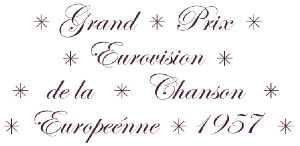
The Eurovision Song Contest 1957 was the second edition of the annual Eurovision Song Contest. Organised by the European Broadcasting Union (EBU) and host broadcaster Hessischer Rundfunk (HR) on behalf of ARD, the contest, originally known as the Grand Prix Eurovision de la Chanson Européenne 1957 was held on Sunday 3 March 1957 and was hosted at the Großer Sendesaal des hessischen Rundfunks in Frankfurt, West Germany by German actress Anaid Iplicjian.
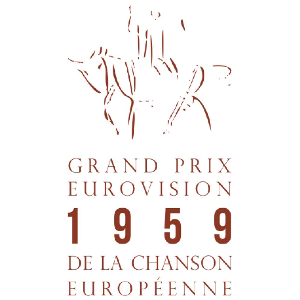
The Eurovision Song Contest 1959 was the fourth edition of the annual Eurovision Song Contest, held on Wednesday 11 March 1959 at the Palais des Festivals et des Congrès in Cannes, France, and hosted by French television presenter Jacqueline Joubert. Organised by the European Broadcasting Union (EBU) and host broadcaster Radiodiffusion-Télévision Française (RTF), the contest, originally known as the Grand Prix Eurovision de la Chanson Européenne 1959, was held in France following the country's victory at the 1958 contest with the song "Dors, mon amour", performed by André Claveau.
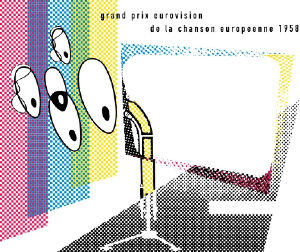
The Eurovision Song Contest 1958 was the third edition of the annual Eurovision Song Contest. Organised by the European Broadcasting Union (EBU) and host broadcaster Nederlandse Televisie Stichting (NTS), the contest, originally known as the Grand Prix Eurovision de la Chanson Européenne 1958 was held on Wednesday 12 March 1958 at the AVRO Studios in Hilversum, the Netherlands and hosted by Dutch television presenter Hannie Lips. This marked the first time that the contest was hosted in the country of the preceding year's winner, a tradition that has been continued ever since.
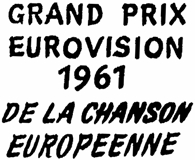
The Eurovision Song Contest 1961 was the 6th edition of the annual Eurovision Song Contest. Once again, the contest was held in the French seaside city of Cannes, having also hosted the 1959 edition. Organised by the European Broadcasting Union (EBU) and host broadcaster Radiodiffusion-Télévision Française (RTF), the contest was again held at the Palais des Festivals et des Congrès on Saturday 18 March 1961, becoming the first contest to take place on a Saturday evening, a tradition that has continued ever since. The show was directed by Marcel Cravenne and again hosted by Jacqueline Joubert, who had also hosted in 1959.
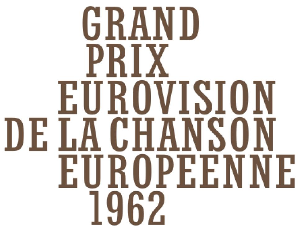
The Eurovision Song Contest 1962 was the 7th edition of the annual Eurovision Song Contest. It took place in Luxembourg City, Luxembourg, following the country's victory at the 1961 contest with the song "Nous les amoureux" by Jean-Claude Pascal. The contest was organised by the European Broadcasting Union (EBU) and host broadcaster Compagnie Luxembourgeoise de Télédiffusion (CLT), and was held at the Villa Louvigny on Sunday 18 March 1962 hosted by the Luxembourgish speaker Mireille Delannoy. This remains the last time that the final of the contest was not held on a Saturday, as since 1963 the final of the contest has consistently been held on a Saturday evening.
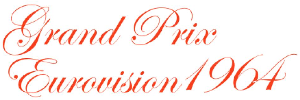
The Eurovision Song Contest 1964 was the 9th edition of the annual Eurovision Song Contest. It took place in Copenhagen, Denmark, following the country's victory at the 1963 contest with the song "Dansevise" by Grethe and Jørgen Ingmann. Organised by the European Broadcasting Union (EBU) and host broadcaster Danmarks Radio (DR), the contest was held at Tivolis Koncertsal on 21 March 1964, and was hosted by Danish TV presenter Lotte Wæver.

The Eurovision Song Contest 1966 was the 11th edition of the annual Eurovision Song Contest. It took place in Luxembourg City, Luxembourg, following the country's victory at the 1965 contest with the song "Poupée de cire, poupée de son" by France Gall. Organised by the European Broadcasting Union (EBU) and host broadcaster Compagnie Luxembourgeoise de Télédiffusion (CLT), the contest was held at the Villa Louvigny on 5 March 1966 and was hosted by Luxembourgish television presenter Josiane Chen.

The Eurovision Song Contest 1967 was the 12th edition of the annual Eurovision Song Contest. It took place in Vienna, Austria, following the country's victory at the 1966 contest with the song "Merci, Chérie" by Udo Jürgens. Organised by the European Broadcasting Union (EBU) and host broadcaster Österreichischer Rundfunk (ORF), the contest was held at the Großer Festsaal der Wiener Hofburg on 8 April 1967, becoming the first contest held in the month of April, and was hosted by Austrian actress Erica Vaal.

The Eurovision Song Contest 1970 was the 15th edition of the annual Eurovision Song Contest and took place in Amsterdam, Netherlands. Organised by the European Broadcasting Union (EBU) and host broadcaster Nederlandse Omroep Stichting (NOS), the contest was held at the RAI Congrescentrum on 21 March 1970, and was hosted by Dutch television presenter Willy Dobbe.

The Eurovision Song Contest 1989 was the 34th edition of the Eurovision Song Contest, held on 6 May 1989 in the Palais de Beaulieu in Lausanne, Switzerland. Organised by the European Broadcasting Union (EBU) and host broadcaster Télévision suisse romande (TSR) on behalf of the Swiss Broadcasting Corporation, and presented by Jacques Deschenaux and Lolita Morena, the contest was held in Switzerland following the country's victory at the 1988 contest with the song "Ne partez pas sans moi" by Céline Dion.
Germany debuted in the Eurovision Song Contest 1956, held on 24 May 1956 at the Teatro Cursaal in Lugano, Switzerland. Nord- und Westdeutscher Rundfunkverband (NWRV), on behalf of ARD, organised a national final held on 1 May 1956 to determine two German entries for the contest. The results were determined by a jury panel. The songs "Das Lied vom großen Glück" by Walter Andreas Schwarz, later known as "Im Wartesaal zum großen Glück", and "So geht das jede Nacht" by Freddy Quinn were selected to represent the nation. German entries performed fourth and eleventh, respectively, out of the 14 entries competing in the contest.
Switzerland held a national pre-selection to choose the two songs that would go to the Eurovision Song Contest 1956. It was held on 28 April 1956.

Germany has officially participated in every Eurovision Song Contest since its inaugural edition in 1956, except in 1996 when its entry did not qualify past the audio-only pre-selection round, and consequently was not seen in the broadcast final and does not count as one of Germany's 66 appearances. No other country has been represented as many times. Along with France, Italy, Spain and the United Kingdom, Germany is one of the "Big Five" countries that are automatically prequalified for the final, due to being the largest financial contributors to the European Broadcasting Union (EBU). The final is broadcast in Germany on ARD's flagship channel, Das Erste.

Monaco has participated in the Eurovision Song Contest 24 times since its debut in 1959. The country's only win in the contest came in 1971, when Séverine performed "Un banc, un arbre, une rue". As a result, Monaco was expected to host the contest in 1972, but it ultimately declined. Monaco is the only microstate to have won the contest to date.
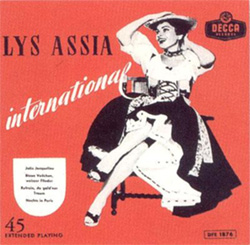
"Refrain" is a song recorded by Swiss singer Lys Assia with music composed by Géo Voumard and lyrics written by Émile Gardaz. It represented Switzerland in the inaugural edition of the Eurovision Song Contest and became the first ever winner of the contest.
Belgium debuted in the Eurovision Song Contest 1956, held on 24 May 1956 at the Teatro Cursaal in Lugano, Switzerland. The Walloon broadcaster INR organised a national final to determine two Belgian entries for the contest. Held on 15 April 1956, the event saw ten songs compete to be the Belgian entries; the results were determined by the jury panel and postcard voting. The songs "Messieurs les noyés de la Seine" by Fud Leclerc and "Le plus beau jour de ma vie" by Mony Marc were selected to represent the nation. Belgian entries performed 3rd and 10th, respectively, out of the 14 entries competing in the contest.
France debuted in the Eurovision Song Contest 1956, held on 24 May 1956 at the Teatro Cursaal in Lugano, Switzerland. The French broadcaster RTF chose its two entries for the contest with the help of the radio program Le Palmarès de la chanson inédite. The songs "Le Temps perdu" and "Il est là" were selected to represent the nation. At the contest, they were performed by Mathé Altéry and Dany Dauberson, respectively.
Géraldine Gogly(born 18 April 1946 in Paris) is a French singer.
Luxembourg participated in the Eurovision Song Contest 1989 with the song "Monsieur" written by Maggie Parke, Gast Waltzing, Yves Lacomblez and Bernard Loncheval. The song was performed by the band Park Café, which was internally selected by the Luxembourgish broadcaster Radio Télévision Luxembourg (RTL) in February 1989 to represent Luxembourg in Lausanne, Switzerland. RTL organised a three-song national final in order to select Park Café's song and "Monsieur" emerged as the winning song following a public televote held via television and radio on 5 and 6 March 1989.













